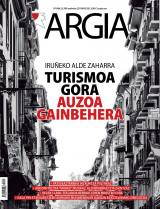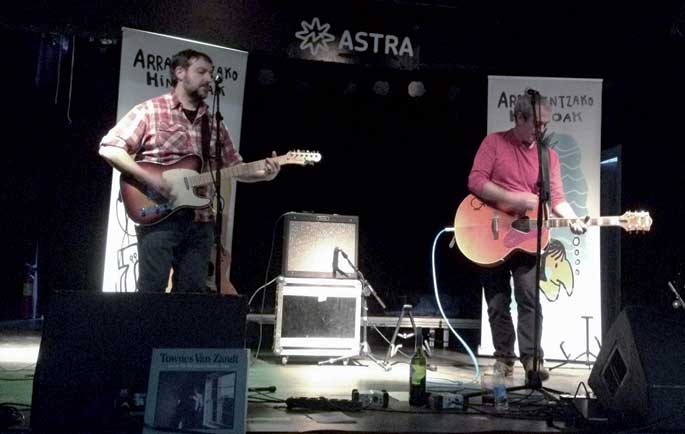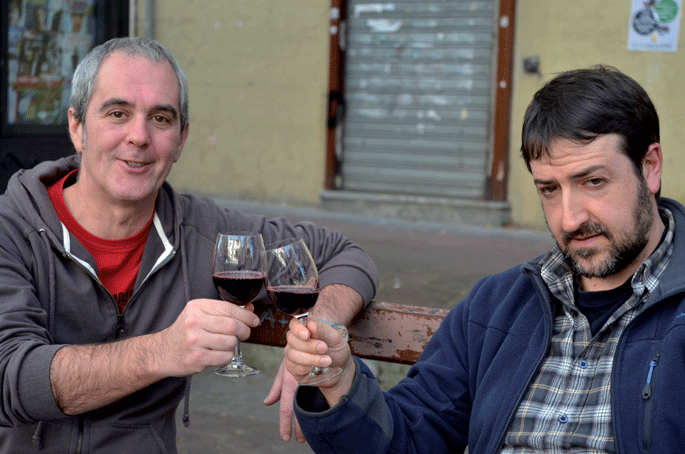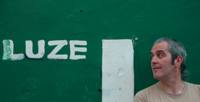"When I open the record, I've seen that a lot of people need to share what they've experienced in surveillance tasks."
- The singer-songwriter Andoni Tolosa ‘Morau’ started walking with her every morning on her mother’s Alzheimer’s. In each session a photo was made and the Sunrise decided to spread it over the network under the name of 'Alperrak'. He has given the same name to the album that he has written telling what he has experienced and learned in caring for his mother. Believing that he was doing his job more intimidating, he has been left with a more social and universal record than ever before.
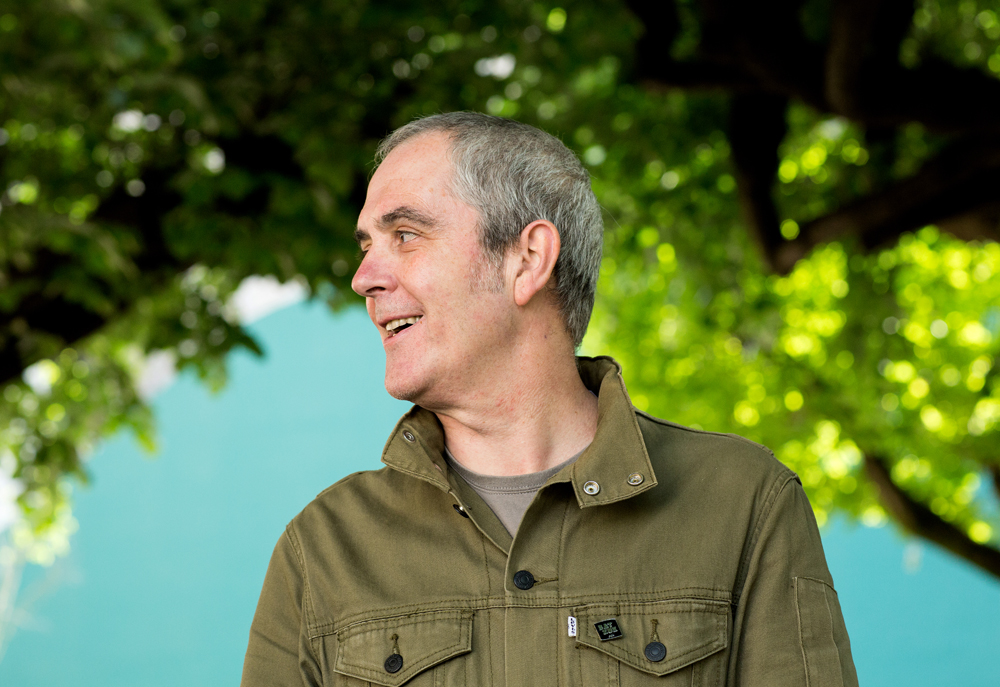
The album is named after a series of photographs. Many of us realized how late we woke up in the face of those photos…
We had been walking between my mother and I for a few years. We would come together at 7:30 to go up to Santa Barbara, always repeating the same path. I created the Facebook account right then, I had a new phone and I started taking pictures. We saw the dawn of Christ and thought it was a good idea to teach the dawn to those who woke up later. That's why the name of the sunrises for sloths. Eventually it became a game, something significant to me and to my mother, something we were doing.
When did these photos become an excuse for a record?
“I
have achieved a great impact with this project, and that has to do with the issue, but also the fact of being a man. The issue of care has become public when man has touched us. There is a gender reading”
At first everything was fear, you couldn’t get used to it… Suddenly I had a lot of new concerns, the situation was not clear… By the time I started taking pictures I had already given a little back to that. With the photos I made a chip change and I thought that what I was experiencing was worth receiving it, receiving some kind of testimony. I wrote a few sentences, a few sketches -- and then those have been the basis of the record.
The list completes the chronicle of your mother's disease, also following the chronological order.
Surely this will be my most literary album, yes. In the direct ones, it almost looks like a little novel. Because I took the job of collecting testimonials, I collected a lot of materials. I ordered that material as I had written it, I wrote the basic idea according to the time, and then I made the songs. It shows a chronological tour of several years.
Many times the photos show us a more beautiful reality than it is. In this case, do the songs show what you have lived with beauty?
I tried to put as few effects and beauty as possible, to count them as I had lived. There is always a elaboration. For me they have been very juicy years, I have learned a lot, I have influenced a lot on my head… And, whether you like it or not, that influences. Over time, you see things differently, but I've tried to keep the essence of those first sketches or ideas.
Without removing anguish from the disease, he has found a special voice to address it. I wouldn't say it's nice, but yes, it's sweet, it's close.
It's easy to fall into the temptation of counting from pain and epic, but people have thanked me for not doing so. I read two comics by Miguel Gallardo, Mary and I and Mary have turned 20 and I loved them. The cartoonist tells what he lives with his autistic daughter, how dramatic it is, but in the real, how sweet it is in a few moments, how comical it is in others… When I read that I thought I also wanted to tell in the same tone what I had lived with my mother. But my style has always been that: tenderness, closeness, attention to the details of everyday life… On this album all that melts.
Watching and caring for a man. It's not the most common. Is that something you've had in mind?
“With the small echo I have, I have total freedom to do what I want.”
The truth is, not at first. But one morning, after having breakfast for my father and my mother, I was pretty happy to go to work, I thought. “Where you go, 85 percent of the women in the world have done the same thing, and no one will thank them, nor will they do anything.” I have achieved a great impact with this project, and that is what the subject is about, but also the fact that I am a man. The issue of care has become public when man has touched us. There is a gender reading or not. But in this case, role-shifting hasn't been something I've been looking for. Someone had to do that surveillance work, and it touched me. And as I make songs, I took my life to sing.
In the song of the mist (noraeza) you have captured the great feelings with small images: a rare puzzle, a lavish garden, a marginal medicine cabinet…
I've long lost my taste for opera and epic. But with my mother, I learned to fix my gaze even more. Our mother looked at Alzheimer's. Walking with him was seeing ants, playing a role… That was his world. Those small things, to me at least, have served me a great deal to talk about. So I've told you things that I wouldn't have been able to tell otherwise.

Reading also leaves us with a very clear picture. You mention your mother in a very direct way in that song.
My mother walked with her head down all the way and raised her head in Zinko-Enea. There they started putting banners four or five years ago and starting reading banners. I leaned again, followed, and if I crossed a bus, I would go back up to read the native… I found that image terrible, because it showed that, despite having forgotten things, I still wanted to learn.
You've made the most intimate record ever, but at the same time, a very social issue. Sooner or later it's up to us all.
“My creativity does not end in songs, the album
is more than music: there is an object, but there is also something to be told, and for that I have used
all the channels that interested me and that I had at hand”
It was a great surprise. What I thought was that I was making a very intimidating record. Then I realized that, after publishing the album and starting with the performances, many people feel like and need to share these kinds of experiences. Care is that kind of love that we outsource. It becomes a torpedo in our way of life that breaks everything: we don’t arrive, we don’t have time… Before that there are different positions, and I have faced it like this. A lot of people have told me that he lives every step of the record, one by one. If you've helped someone, it's no small thing.
I liked the way of talking about imagination and memory in the song Bi argazki. How truthfulness isn't that important.
Memory is a word that we have been talking about a lot in recent years, let's not say here. But you realize that, after all, memory is not as scientific or as unquestionable as we think. I've seen it clearly with my mother. Instead of giving so much importance to memory, I think the problem arises when we don't have the ability to generate new memories. If we go two people to the mountain and something happens to us, two weeks later we have two very different versions. There is not a single memory. When they tell you Alzheimer's is one of the main fears: When you won't know me? But the hardest part is that, losing the imagination and the ability to create new memories.
You just made this album, accompanied less than usual by Beñardo Goietxe. Was this required by the project?
It's very cruel to say so, but I didn't have time to get on with this until my mother's care process was over. Once I've finished, I've taken advantage that Beñardo was with the border's neighbor to do this alone. Still, Beñardo is very present on the album. He's been joined by spectacular voices, and he's been involved in the whole project as an assistant and an advisor. I believe, however, that it was a wise decision to do alone, and that has given me a lot of freedom and quiet.
It is increasingly stressed that the capacity for transformation is not in messages, but in how to do so. You yourself attach great importance to the process and to the form.
“Instead of giving so much importance to memory, I think the problem arises when we don’t
have the ability to generate new memories.
That’s the hardest thing.”
That is a conscious decision. Behind the small decisions that musicians make, there's something ideological. Dissemination under the Creative Commons license, possibility of downloading on the network, production of physical discs by hand and in auzolan… It is not just an aesthetic. We have to support in some way what we say and demand. I think it's the best way for the singer to have shadow and influence in our community and in our environment.
What place does Morau occupy in the Basque song? It’s a question you asked yourself…
On the one hand, I realized that I have to enjoy everything I do, without waiting for the result. Because it may not have worked. And on the other hand, with the small echo I have, I have total freedom to do what I want. It does not depend on the commercial conditions of the musicians, nor on the political or vital conditions. I can do whatever I want, and that's great luck. From these reflections came the hymns for the fish, and this time I have also done it in the same way. With the intention of influencing the people I care about and the environments I care about.
Many musicians of your age claim that they are very laborious in the constant communication and promotion work of the network. You, on the other hand, work naturally.
For me, the Internet has been a great tool, in its breadth. For a minority musician, networks are very effective. To me, especially the blog has helped me. I am not able to write a novel, but with the blog posts I can tell a lot of things. My creativity doesn't end in songs, it creates things to tell, and the blog is the site for that. In this case, the album is more than music: there's an object, but there's also something to tell, and to tell it, I've used all the channels that I was interested in and that I had at hand.
You have already given some direct answers. Is it difficult to defend such a personal story about the scenario?
It's been a pretty big challenge. My bet is to play the record as it is, as if it were a novel or a movie, telling the whole story. That makes me very vulnerable and I'm not used to it. My natural environment is the bar, and I have my tools, but it's not easy to wake up to the interest of someone who's drinking a beer at 12 o'clock at night. Still, I've played in a couple of bars, and they've been really nice experiences. There are people who have come to listen to me because this is the issue, and that also makes the work much easier for me. Then they come to thank me, to tell me their story…









